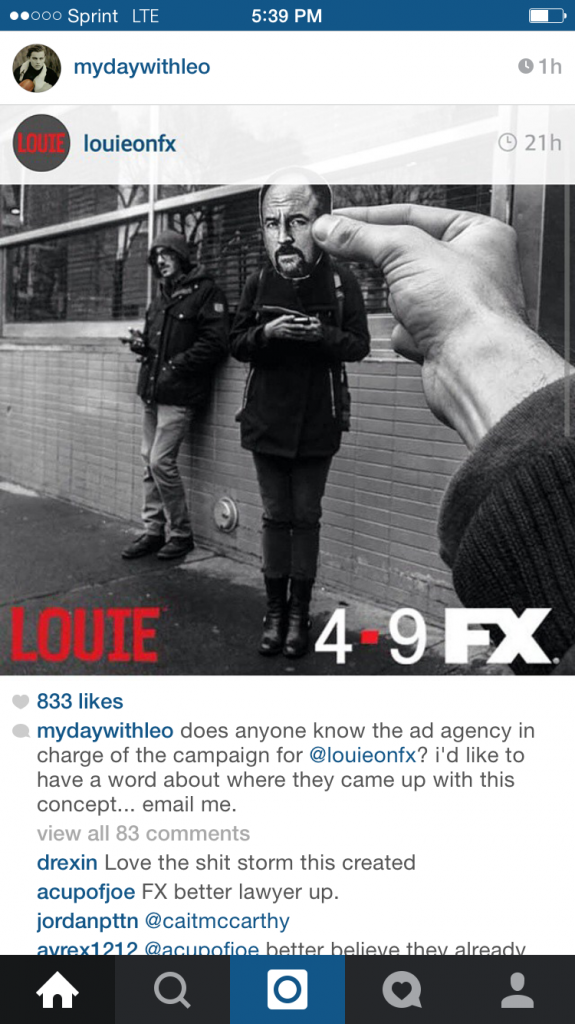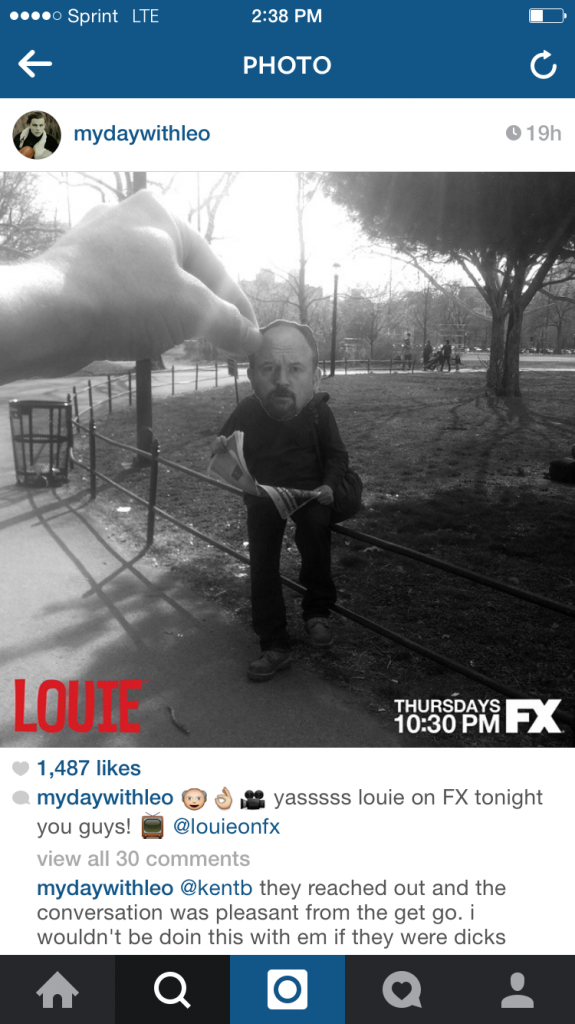A couple days ago I was thumbing through my Instagram feed when I came across this:
It’s a re-gram of an ad for the new season of Louie, the Louis C.K. comedy on FX from an account called @mydaywithleo. @mydaywithleo is a personal account run by New Yorker Joel Strong, where he strategically places cut-out celebrity heads over the bodies of everyday New Yorkers. And he believes that FX unfairly copied his style with this campaign.
Strong has created 309 posts to date since last year, amassing 144,000 followers. He claims he is the originator of the idea and is not happy he was not consulted before the ad campaign went live. Strong told gothamist.com, “[The campaign] is a cheap knockoff of my work. Seeing as I’m a fan of Louis and he’s spoken out about joke stealing, I thought it interesting that they didn’t just ask me. I’d have done it cheap, too, because I’m a fan and I do things cheap for people I like. Is there much I can do about it? I dunno, but I do think it’s bullshit and a lot of artists do, too.”
So is appropriating ideas and/or repurposing content from social media influencers a bullshit tactic? And what does it mean for Louie and FX as brands? I’m willing to bet it depends on which side of the fence you come down on (marketer or customer). Let’s start with the side that calls “bullshit.”
Strong is pissed because a major brand has almost certainly seen his work on Instagram and said, “Hey, let’s do that for our new campaign.” In the ancient world, different civilizations invented similar things around the same time on different sides of the globe. I think it’s safe to say that’s just not the case here. The marketing team behind this campaign used Strong’s style and didn’t acknowledge him. Morally, this just reeks of poor form.
But does it infringe on any kind of intellectual property rights? Unfortunately for Strong, it’s a tough case to make. It’s kind of like if I went to New Mexico, took and published some beautiful photos, then got a cease and desist letter from Ansel Adams’ lawyers. Sorry, but it just doesn’t work that way. Without substantial proof that he is the sole originator and practitioner of the idea and that FX’s marketing team had knowledge of his work, (and an expensive legal team to do it), the likelihood of Strong having any recourse is very low.
But if reworking influencer content is legally fair game, is it a good idea from a brand’s perspective? While they obviously walk on thin moral ice, ultimately we’ll need to wait and see how well the new season fares. There are a couple different sides to this debate, but they both have one shared conclusion: it’s risky.
On the one hand, there’s this “billion dollar mistake.” Evidence says if you make a goof or do something dramatic on social media you will see the chances of your content being noticed and engaged with go through the roof. There’s conversation and debate online and off, with the brand always at the center.
On the other hand, the risk of backlash is real. The account for Louie was freshly created for this new season and therefore had very few followers. While @mydaywithleo racked up nearly 850 likes in the first hour his regram was posted, only 2 of Louie’s 13 total posts received more than 150 likes at all. For Instagram influencers, that is chump change.
Urban Outfitters is another brand who has gotten themselves in some hot water for allegedly stealing independent designers’ work repeatedly, but you don’t see their stores closing down en masse.
Instead of expressing excitement for the show and admiration for the ads, most of the comments on the Louie posts are from angry users supporting @mydaywithleo. One user rightly points out that the agency behind the Louie campaign would have done much better for themselves and their client had they officially collaborated with @mydaywithleo instead of simply ripping him off.
And that’s just it. The lesson for brands here is to tread lightly when repurposing content or appropriating ideas for your content marketing, especially when they come from influencers on social media. While Urban Outfitters may be able to get away with “stealing” designs from a little-known Etsy seller, when that person has tens of thousands of followers it becomes a much riskier proposition.
If you want to steal an idea from an influencer on social media, consider the repercussions in light of your brand values. Are you out to make a buck no matter whose grandmother you have to knock over to get it? Or are you a company whose strong moral values come first?
Courting controversy may create a wave of excitement and debate that ignites your product beyond your expectations. Or you could see mostly backlash at what is perceived as a cheap, dishonest attempt to make a connection with your audience. It’s up to you to decide where your brand falls on that spectrum. I know which side of the fence I come down on.
Update: @mydaywithleo posted this to his Instagram yesterday. We’re glad to see everybody getting along.
Image Credit: Reading the Maps Blog




